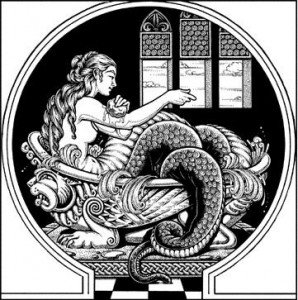 World premieres are a rarity, and are especially uncommon in smaller cities like Providence. Even more unusual is to have two world premieres by the same composer in the same small city within the same year.
World premieres are a rarity, and are especially uncommon in smaller cities like Providence. Even more unusual is to have two world premieres by the same composer in the same small city within the same year.
When I last spoke with composer Steven Jobe in May, it was days before the inaugural performance of his “Newman Cantata,” a piece for full chorus newly commissioned by the Newman Congregational Church. At that time, he was nearing completion of his second opera. On Saturday, September 13, Jobe’s opera The Legend of The Fairy Melusine will have its world premiere as part of the FirstWorks 2014-15 season.
Jobe started this project seven years ago, coinciding with a previous collaboration with FirstWorks.
“The Melusine story has been of interest to me since the 1980s,” says Jobe. “I read a novel called The Wandering Unicorn by Manuel Mujica Láinez, which is narrated by the character Melusine. The story has been fermenting in my psyche ever since. In 2007 I created a show for FirstWorks titled Music For 3 Hurdy-Gurdys, and I realized I had sufficient [musical] material in place for another opera. I felt that certain components of the Melusine story would make for a good opera. That was the point at which I started my research.”
Jobe shared his idea with the folks at FirstWorks, and they were eager to collaborate.
Melusine is a mythical character whose origin dates back to 14th century French folklore. She is half-human and half-fairy. As the result of a curse bestowed upon her by her mother, Melusine undergoes a once-weekly metamorphosis into a half-human and half-serpent creature, a condition she keeps secret from her husband Raimondin.
“The original work, Le Roman de Mélusine by Jean d’Arras, is a large scale two-volume tome that is mainly about the sons of Melusine going off to fight the crusades,” explains Jobe. “My first choice as librettist was to focus more on the two leads, Melusine and Raimondin, and on the love story.”
Jobe incorporated his own custom-designed instruments into this score, including pitched and unpitched glass jars (admittedly an homage to American 20th century composer Harry Partch), and a Bosch Hurdy-Gurdy, which is a 10-foot-long instrument that requires at least two people to operate. The rest of the instrumentation includes violin, cello, string bass, pipe organ, harp and percussion. This production features the music direction of long-time Rhode Island Philharmonic violinist Laura Gulley, and vocal soloists Kara Lund and Fred Scheff. Five other vocalists round out the score.
By necessity, Jobe has worn all the hats in this process: grants and funding manager, research analyst, music director and instrument builder, not to mention composer, librettist and visionary. It’s an awful lot for one person to coordinate, and Jobe had his doubts along the way.
“While I was researching the libretto, I read a new translation into modern English by Matthew Morris, a professor of French at Emory University,” says Jobe. “I contacted him at the beginning of this process and we became friends. Sadly, he passed away earlier this year. That was right at the time when I was considering whether to go forward with the production. His obituary mentioned me and the opera and I felt that, if it was important enough to them to mention in the obituary, then I had to follow through.”
Thanks to funding from the Rhode Island State Council on the Arts, a Kickstarter campaign, and Steven Jobe’s vision and determination to bring this work to life, Melusine will make her first appearance here in the Ocean State. Though it took her 800 years to get here, I have a hunch she will be well worth the wait.
Performances of The Legend Of The Fairy Melusine are September 13, 14, 20 and 21 at the Roundtop Center at Beneficent Church, 100 Weybossett St., Providence. For more information and tickets, visit first-works.org. Also of note, see melusineopera.com for a behind-the-scenes view of this incredible project.
More Posts by The Author:
Summer Guide to Classical Music 2024
Considering Matthew Shephard: An uncommon musical work for uncertain times
Emotions and Music: What makes music scary?
Fall Guide to Classical Music
Fall Guide to Classical Music 2022




Joe DeMarco did a wonderful job with this interview. I'm very grateful.